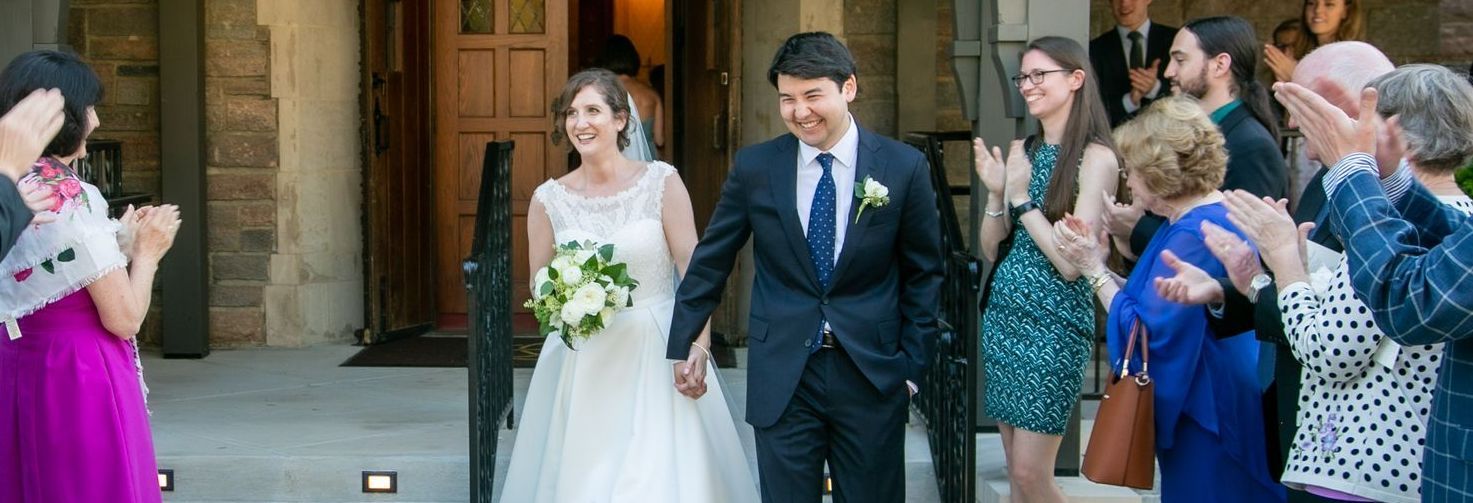
Sacraments
The Book of Common Prayer defines a sacrament as an outward and visible sign of an inward and spiritual grace. Sacraments are ritual acts of the Church that express connection between God and God’s people. The Episcopal Church recognizes seven sacraments:
Holy Baptism
Holy Baptism is full initiation by water and the Holy Spirit into Christ’s body, the Church. Holy Baptism for adults, children, or infants may be scheduled at the the 11:15 a.m. service on one of these Sundays: The Easter Vigil, The Day of Pentecost, Trinity Sunday, The Feast of St. Mary the Virgin, All Saints' Sunday, Christ the King Sunday, and on the Feast of the Baptism of our Lord (the first Sunday after the Epiphany). There is a required Baptism workshop the Saturday immediately preceding the Sunday of the Baptism. Please contact Annie Slaughter, Liturgical Assistant, 336-272-6149, ext. 229 or annie@holy-trinity.com. There is more information here.
Holy Eucharist
The principal act of worship on the Lord’s Day is the celebration of the Holy Eucharist. The liturgy remembers Jesus’ meal with his disciples, when he shared the bread and wine and declared, “This is my body, this is my blood.” The Episcopal Church believes in the real presence of Christ in and through the Holy Eucharist. All baptized Christians are welcome to share in this meal at God’s table. Through Eucharist, God offers the grace of healing and the blessing of the Holy Spirit. We take the Body and Blood of Christ into our own bodies to become “living members” of Christ’s Body in the world.
Confirmation
Confirmation is a public affirmation of faith during which a bishop lays hands on the confirmand, praying for strengthening by the power of the Holy Spirit. Adults who have been confirmed in another church can be received into the Episcopal Church, and adults who have been confirmed can re-affirm baptismal vows during a confirmation service.
Adults who would like to be confirmed are asked to complete the Inquirer’s Class and Living Members Class (offered each year on Sunday mornings) before being confirmed at the Bishop’s next visit, which is usually in June. Adults interested in confirmation should contact a clergy member listed in the staff directory.
At Holy Trinity, young people are traditionally confirmed when they are in eighth grade or older. Teens prepare for confirmation during Sunday morning classes in January and February and at a retreat in the spring. Confirmation takes place during the Bishop’s annual visit, usually in early June. Teens who would like to be confirmed should contact Marjorie Donnelly at marjorie@holy-trinity.com or 336-272-6149, ext. 221.
Reconciliation of a Penitent (confession)
The Reconciliation of a Penitent – or opportunity to make a confession – is available to anyone at any time. Any Christian can hear a confession, but only a bishop or priest can pronounce absolution. Confessions may be formal, with the penitent kneeling before a confessor, or informal, with the penitent and clergy meeting for a spiritual conference. For more information, contact a clergy member listed in the staff directory.
Holy Matrimony
The Book of Common Prayer defines Holy Matrimony as a sacramental rite in which two people enter into a lifelong union, make their vows before God and the Church, and receive the grace and blessing of God to help them fulfill their vows. There is more information here.
Ordination
In the Episcopal Church, bishops, priests, and deacons are ordained. Bishops lead and supervise the church; priests help govern the church, carry out missionary and pastoral work, preach, and administer sacraments; deacons assist bishops and priests in their work. No one can exercise the duties of these offices unless ordained. Discerning a call to Ordination occurs in community with others and usually includes clergy and laity from a local congregation, chaplains at educational institutions, members of the bishop’s staff, local and regional leaders, and trusted friends.
Unction (anointing with oil)
As a blessing for the sick or dying, a priest may perform unction. The priest prays for the person to be forgiven from sin, released from suffering, and restored to wholeness and strength. For information, contact a clergy member listed in the staff directory.
